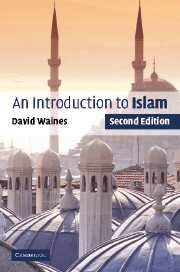Book contents
- Frontmatter
- Contents
- List of plates
- Preface and Acknowledgments
- Map
- Introduction
- PART 1 FOUNDATIONS
- PART 2 ISLAMIC TEACHING AND PRACTICE
- 3 Divine will and the law
- 4 Theology: faith, justice, and last things
- 5 The way of the Sufi
- 6 The way of the Imams
- PART 3 ISLAM IN THE MODERN WORLD
- Excursus on Islamic origins
- Glossary
- Notes
- Further reading
- Index
- Plate section
4 - Theology: faith, justice, and last things
Published online by Cambridge University Press: 05 October 2014
- Frontmatter
- Contents
- List of plates
- Preface and Acknowledgments
- Map
- Introduction
- PART 1 FOUNDATIONS
- PART 2 ISLAMIC TEACHING AND PRACTICE
- 3 Divine will and the law
- 4 Theology: faith, justice, and last things
- 5 The way of the Sufi
- 6 The way of the Imams
- PART 3 ISLAM IN THE MODERN WORLD
- Excursus on Islamic origins
- Glossary
- Notes
- Further reading
- Index
- Plate section
Summary
FAITH AND COMMUNITY
Some scholars labored to construct a logically consistent methodology of the law and to elaborate the detail and scope of its coverage. Others, working upon the same raw data, strove to define the nature of belief and to find answers to questions concerning the nature of Allah. These answers were, in turn, relevant to questions concerning the individual's freedom of action in this world and fate in the hereafter. The beginnings of these inquiries in the second half of the first/seventh century are not easily distinguished from the first tentative steps taken in a number of other disciplines which came to comprise the Islamic sciences; in one way or another, these sciences were concerned with the facts and context of the prophetic-revelatory event and with grasping its meaning and implications for correct belief and proper action in the post-prophetic period.
A famous hadith, included by both al-Bukhari and Muslim in their collections, recounts an incident in Muhammad's lifetime as narrated by ʿUmar b. al-Khattab, later to become the community's second Caliph after the Prophet's death. ʿUmar said:
One day when we were with Allah's messenger, a man with very white clothing and very black hair came up to us. No mark of travel was visible on him, and none of us recognized him. Sitting down beside the Prophet, he said, “Tell me, Muhammad, about islam.” […]
- Type
- Chapter
- Information
- An Introduction to Islam , pp. 103 - 132Publisher: Cambridge University PressPrint publication year: 2003

